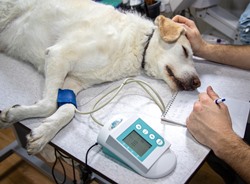Veterinary Technician College
How to Find the Best One Near Stanford California
 Fulfilling your lifelong aspiration of working with and helping animals by enrolling in a vet tech college near Stanford CA might initially seem like a daunting undertaking. After all, you have to find and enroll in a school that will deliver the appropriate training to ensure that you can succeed as a veterinary technician. And so that you pick the right one you must research and compare all of the schools you are considering. Many aspiring students launch their due diligence process by looking for colleges that are near their residences. Once they have found some area schools, they ascertain which ones have the lowest tuition and focus on those. Although cost and location are important considerations when assessing vet tech programs, they are not the only critical ones when making your assessments. Job placement and intership programs in addition to accreditation are equally important if not more so as cost and location. The bottom line is that before making a selection, you need to finish your due diligence and compare all important aspects of the schools you are examining. We have furnished several in this article to help get you started, but before we review them we'll discuss the various responsibilities of veterinary technicians and the training options available.
Fulfilling your lifelong aspiration of working with and helping animals by enrolling in a vet tech college near Stanford CA might initially seem like a daunting undertaking. After all, you have to find and enroll in a school that will deliver the appropriate training to ensure that you can succeed as a veterinary technician. And so that you pick the right one you must research and compare all of the schools you are considering. Many aspiring students launch their due diligence process by looking for colleges that are near their residences. Once they have found some area schools, they ascertain which ones have the lowest tuition and focus on those. Although cost and location are important considerations when assessing vet tech programs, they are not the only critical ones when making your assessments. Job placement and intership programs in addition to accreditation are equally important if not more so as cost and location. The bottom line is that before making a selection, you need to finish your due diligence and compare all important aspects of the schools you are examining. We have furnished several in this article to help get you started, but before we review them we'll discuss the various responsibilities of veterinary technicians and the training options available.
IT TAKES JUST A FEW MINUTES TO START YOUR VET TECH CAREER BELOW
Vet Technician Training Options

One of the initial decisions that you will need to make is if you want to train as a vet assistant, technologist or technician. Part of your determination might be based on the amount of time and money that you have to devote to your education, but the primary determiner will probably be which specialization appeals to you the most. What techs and assistants share in common is that they all work under the direct supervision of a practicing and licensed veterinarian. And even though there are many duties that they can carry out within the Stanford CA veterinary practice or hospital, they can't prescribe drugs, diagnose health issues, or carry out surgical procedures. In those areas they can only provide assistance to a licensed veterinarian. There are technicians and technologists that work outside of the conventional vet practice, such as for zoos, animal shelters or police departments. Let's take a look at the responsibilities and training requirements for each specialty.
- Vet Assistants in most cases will have completed a formal training program, either as an apprentice or intern in a vet clinic or hospital, or by finishing a certificate program at a vocational school or community college. As the name implies, their job function is to assist the vets and vet technicians in the execution of their duties. Normally they are not associated with more complicated undertakings, for example assisting with surgeries. Some of their regular responsibilities may include working at the front desk, cleaning and preparing exam rooms and equipment, or handling animals during exams.
- Vet Technicians get more extensive training compared with assistants and usually acquire a two year Associate Degree, ideally from an American Veterinary Medical Association (AVMA) accredited program. They are in a fashion the vet equivalent of medical nurses, since their basic job duty is to assist veterinarians with diagnosing and treating animal patients. Where they differ from veterinary assistants is that they are involved in more involved activities, such as assisting with surgical procedures or providing medicine. All states currently mandate that veterinary techs pass a credentialing examination for either registration, certification or licensing.
- Vet Technologists are comparable to veterinary techs and for the most part carry out the same job functions. They are required to attain a Bachelor's Degree in veterinary technology, which typically takes four years to complete. So the only real difference between a vet technologist and a technician is the technologist's more advanced level of education. But with an advanced degree comes more job opportunities, increased salaries and potential management positions. They are additionally mandated to pass a credentialing exam for either certification, registration or licensing.
Vet techs and technologists can specialize in areas such as internal medicine, anesthesia or urgent care. A number may obtain certification from the American Association for Laboratory Animal Science (AALAS) to work in Stanford CA labs or research facilities as well.
Online Vet Tech Schools Offered
 An option that might be a solution for those with a hectic lifestyle or who are working full time while attending veterinary college is to enroll in an online training program. Since the classes are provided by means of the internet, students can study on their own schedule wherever a computer is available. The course of study is taught using multiple venues, including videos, slide shows and live streaming webinars. And since most veterinary tech and technologist degrees require practical training, that segment can usually be fulfilled as an internship or work study program at a local Stanford CA veterinary clinic or hospital. Distance learning, as it is also called, may in some instances decrease the cost of your education. Tuition and supplementary expenses, for instance for commuting and study materials, may be more affordable compared to more conventional classroom programs. Just make sure that the online school that you select is accredited, either by the AVMA or another nationally certified accrediting organization. With the online classes and the clinical training, everything is furnished for a comprehensive education. So if you are disciplined enough to learn in this more independent fashion, an online veterinary technician program may be the perfect option for you.
An option that might be a solution for those with a hectic lifestyle or who are working full time while attending veterinary college is to enroll in an online training program. Since the classes are provided by means of the internet, students can study on their own schedule wherever a computer is available. The course of study is taught using multiple venues, including videos, slide shows and live streaming webinars. And since most veterinary tech and technologist degrees require practical training, that segment can usually be fulfilled as an internship or work study program at a local Stanford CA veterinary clinic or hospital. Distance learning, as it is also called, may in some instances decrease the cost of your education. Tuition and supplementary expenses, for instance for commuting and study materials, may be more affordable compared to more conventional classroom programs. Just make sure that the online school that you select is accredited, either by the AVMA or another nationally certified accrediting organization. With the online classes and the clinical training, everything is furnished for a comprehensive education. So if you are disciplined enough to learn in this more independent fashion, an online veterinary technician program may be the perfect option for you.
Things to Ask Vet Tech Programs
 By now you should have determined which veterinary credential that you wish to attain, and if you intend to study online or attend a college on campus. Since there are a large number of veterinarian community colleges, vocational and technical schools in the Stanford CA area as well as across the United States, you should ask some relevant questions to help narrow down your list of options. As we pointed out in our opening, many potential students start by concentrating on location and the cost of tuition. But we have already mentioned other essential qualifiers, such as internship programs and accreditation. And naturally you want to select a program that offers the degree and specialty that you are interested in. These and other factors are covered in the checklist of questions that you need to ask the vet tech colleges that you are considering.
By now you should have determined which veterinary credential that you wish to attain, and if you intend to study online or attend a college on campus. Since there are a large number of veterinarian community colleges, vocational and technical schools in the Stanford CA area as well as across the United States, you should ask some relevant questions to help narrow down your list of options. As we pointed out in our opening, many potential students start by concentrating on location and the cost of tuition. But we have already mentioned other essential qualifiers, such as internship programs and accreditation. And naturally you want to select a program that offers the degree and specialty that you are interested in. These and other factors are covered in the checklist of questions that you need to ask the vet tech colleges that you are considering.
Is the Vet School Accredited? It's important that you make sure that the vet tech program you choose is accredited by a regional or national accrediting organization. As previously mentioned, one of the most highly respected is the American Veterinary Medical Association (AVMA). Trade schools and colleges that are accredited by the AVMA have undergone an extensive screening process that ensures you will get a superior education. Also, accreditation is essential if you are requesting a student loan or financial aid, since many programs are not offered for non-accredited programs. Last, having a degree or certificate from an accredited program is often a precondition for employment for many Stanford CA area veterinary clinics and hospitals.
What is the Program's Reputation? The veterinary vocational school or college and program you enroll in should have an exceptional reputation within the veterinary field. You can start your due diligence by asking the colleges you are interested in for endorsements from the employers in their job placement network. Other tips include checking with online school ranking websites and speaking with the school's accrediting agencies as well. You can ask the California school licensing department if there have been any grievances or infractions concerning your specific schools. As a final pointer, get in touch with some Stanford CA veterinary clinics that you might want to work for after you get your training. Find out what they think about your school selections. They may even suggest some programs not on your list.
Are there Internship Programs? The most effective way to get practical hands on training as a vet tech is to work in a clinical setting. Ask if the programs you are reviewing have internship programs arranged with Stanford CA veterinarians, vet clinics or hospitals. Most veterinary medicine programs mandate practical training and a large number furnish it by means of internships. Not only will the experience be valuable as far as the practical training, but an internship can also help establish associations in the local vet community and assist in the search for a position after graduation.
Is Job Placement Offered? Getting a job after graduating from a vet tech college can be difficult without the help of a job placement program. To start with, find out what the graduation rates are for the programs you are evaluating. A low rate may suggest that the instructors were ineffective at teaching the curriculum or that a number of students were disappointed with the program and quit. Next, verify that the schools have a job placement program and ask what their placement rates are. A high placement rate might mean that the school has an excellent reputation within the Stanford CA vet community and has a significant network of contacts for student placements. A lower rate could mean that the training is not highly thought of by employers or that the job placement program is ineffective at placing students.
How Big are the Classes? If the classes are bigger, you most likely will receive little or no individualized instruction from the teachers. Solicit from the Stanford CA colleges you are considering what their classroom teacher to student ratios are. You may also want to sit in on a couple of classes (if practical) to observe the interaction between instructors and students. Get feedback from students concerning the quality of instruction. Also, speak with the instructors and determine what their backgrounds are as well as their methods of teaching.
Where is the School Located? Okay, we already talked about location, but there are a few more points to consider on the subject. If you are going to commute to your veterinary technician classes from your Stanford CA home, you must make certain that the driving time is compatible with your schedule. For instance, driving during the weekend to investigate the route won't be the same as the drive during rush hour traffic, particularly if the campus is located near or in a larger city. Also, if you do decide to enroll in a school in another state or even outside of your County of residence, there may be higher tuition fees especially for state and community colleges. Of course attending online classes may be an option that will give you more flexibility and decrease the need for travel.
Do the Classes Fit Your Schedule? And finally, it's important that you find out if the veterinary schools you are looking at offer class times flexible enough to accommodate your schedule. For example, many students continue working full time and can only go to classes on the weekends or at night near Stanford CA. Others may only be able to go to class in the morning or in the afternoon. Make certain that the class times you require are available prior to enrolling. Also, find out if you can make-up classes that you may miss due to illness, work or family issues. You may find that an online college is the best way to fit your veterinary training into your hectic life.
Learn More About How to Become a Veterinary Technician in Stanford
Chosse the Right Stanford Veterinary Technologist School
Selecting the ideal veterinary technician school is a critical first step to beginning a rewarding career providing treatment and care for animals. Future students thinking about veterinary technician colleges need to make their determination based on a number of key issues. Veterinary technicians and technologists work in vet clinics, animal hospitals and animal shelters. They typically take on administrative duties and support the veterinarian with the animals when needed. As we have discussed, it's imperative that you decide on a veterinary medicine program that is both accredited and has an outstanding reputation within the field. This goes for vet tech online colleges as well. By asking the questions included in our checklist for reviewing schools, you will be able to reduce your choices so that you can make your final decision. And by selecting the ideal program, you can reach your goal of becoming a vet tech in Stanford California.
Stanford Vet Tech Programs | Stanford How To Become A Vet Tech
